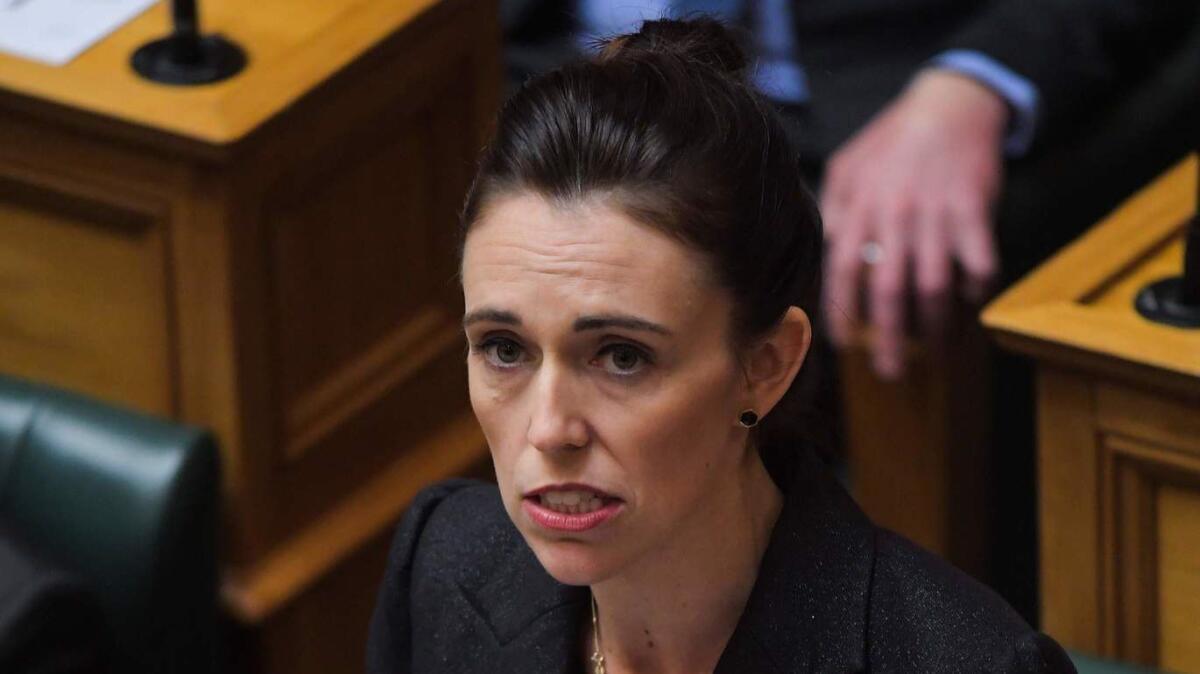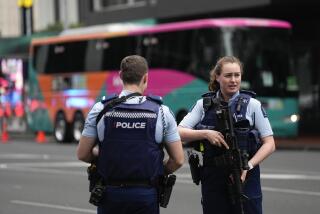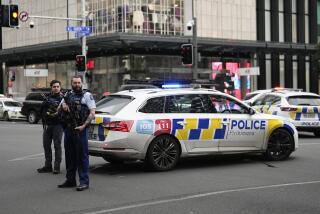New Zealand’s Ardern hopes to deny shooting suspect notoriety by not saying his name

- Share via
New Zealand Prime Minister Jacinda Ardern said she would deny the accused gunman the fame he sought by refusing to even speak his name in an emotional parliamentary meeting on Tuesday, the first since the worst massacre in her country’s modern history.
Espousing anti-immigrant, white nationalist ideology, 28-year-old Australian national Brentan Tarrant allegedly killed 50 people at two mosques in Christchurch on Friday, rattling a country that takes pride in its safety, diversity and openness.
“He sought many things from his act of terror, but one was notoriety,” Ardern said. “And that is why you will never hear me mention his name.”
She added: “He is a terrorist, he is a criminal, he is an extremist. But he will, when I speak, be nameless.”
RELATED: In the chaos of the New Zealand mosque attacks, one hero’s action saved lives »
Tarrant has so far been charged with a single count of murder, but authorities say more charges are coming. On Tuesday, police had just wrapped up forensic work at the house he rented in the city of Dunedin, south of Christchurch, and where authorities believe he had meticulously planned his attack.
Tarrant has fired his court-appointed lawyer and says he plans to represent himself in court, leading some to speculate that he’s hoping to use the proceedings as a further platform for espousing extremist white-nationalist beliefs.
The massacre has shocked the world not only because of its scale — the shooter continued his rampage for more than 30 minutes at two mosques before he was arrested — but also for the brazenness in which it was livestreamed on Facebook. Dozens commented, cheering him on, while others watched horrified as social media giants struggled to prevent the 17-minute video from being downloaded and shared over and over again.
He also published a 74-page manifesto ahead of the attacks, sharing it on Twitter and sending to dozens within New Zealand, including Ardern’s office and media outlets.
While Tarrant is held in detention ahead of his next court appearance on April 5, he will be denied access to media, including radio, television and newspapers. The New Zealand Herald reported that he is under 24-hour surveillance and will not be allowed visitors.
Ardern declined to say whether his trial will happen behind closed doors, but emphasized to reporters that New Zealand will deny him the ability to lift his profile through the attacks. In his only court appearance so far, Tarrant’s face was blurred out in photographs and the video feeds showing him escorted into the courtroom, which the judge says will protect his right to a fair trial.
Despite the overwhelming support and praise for New Zealand’s handling of the massacre’s aftermath, families of victims are growing increasingly frustrated at the delay in receiving their loved ones’ bodies.
Postmortems had been completed on all 50 victims, police said in a statement Tuesday night, more than four days after the attacks. Twelve victims had been identified but only six bodies had been returned to their families.
“Police are acutely aware of frustrations by families associated with the length of time required for the identification process following Friday’s terror attack,” the police said.
According to Muslim beliefs, bodies should be washed and buried as soon as possible, preferably within 24 hours. The delays are causing many families more trauma after the attacks.
“Normally we shouldn’t wait too long to bury, but in this case they’re still taking time,” Mohammed Bilal, whose cousin Syed Areeb Ahmen was killed in the attacks, told the New Zealand Herald.
Tariq Mohammed, whose father was killed, said tensions were running high.
“Fathers have died, brothers have died, everyone wants their body back, man,” he told Stuff, a local news website. “There’s going to be a lot of emotions, man. We are humans, we are not angels. We will have feelings.”
Police authorities said they were aware of the cultural concerns and were trying to proceed as quickly as possible.
“While identification may seem straightforward, the reality is much more complex, particularly in a situation like this,” the police statement said. “We are doing all we can to undertake this work as quickly as possible and return the victims to their loved ones.”
Deborah Marshall, Christchurch’s chief coroner, had previously said the process would “take as long as it takes.”
“There is nothing worse than returning the wrong body to the wrong family, and we find from overseas examples when you try and speed up a process or miss out steps that is exactly what happens, and it’s not going to happen here,” she said.
Ardern said Monday that she expected all bodies to be returned to the families by Wednesday, but that now looks unlikely.
A funeral home is awaiting the bodies so they can be washed and wrapped according to Muslim custom, and rows of graves have been dug at a cemetery in Christchurch. The New Zealand government has offered to pay the funeral costs of all the victims, including repatriating the bodies if requested.
Shibani Mahtani and Anna Fifield write for the Washington Post.
More to Read
Sign up for Essential California
The most important California stories and recommendations in your inbox every morning.
You may occasionally receive promotional content from the Los Angeles Times.










